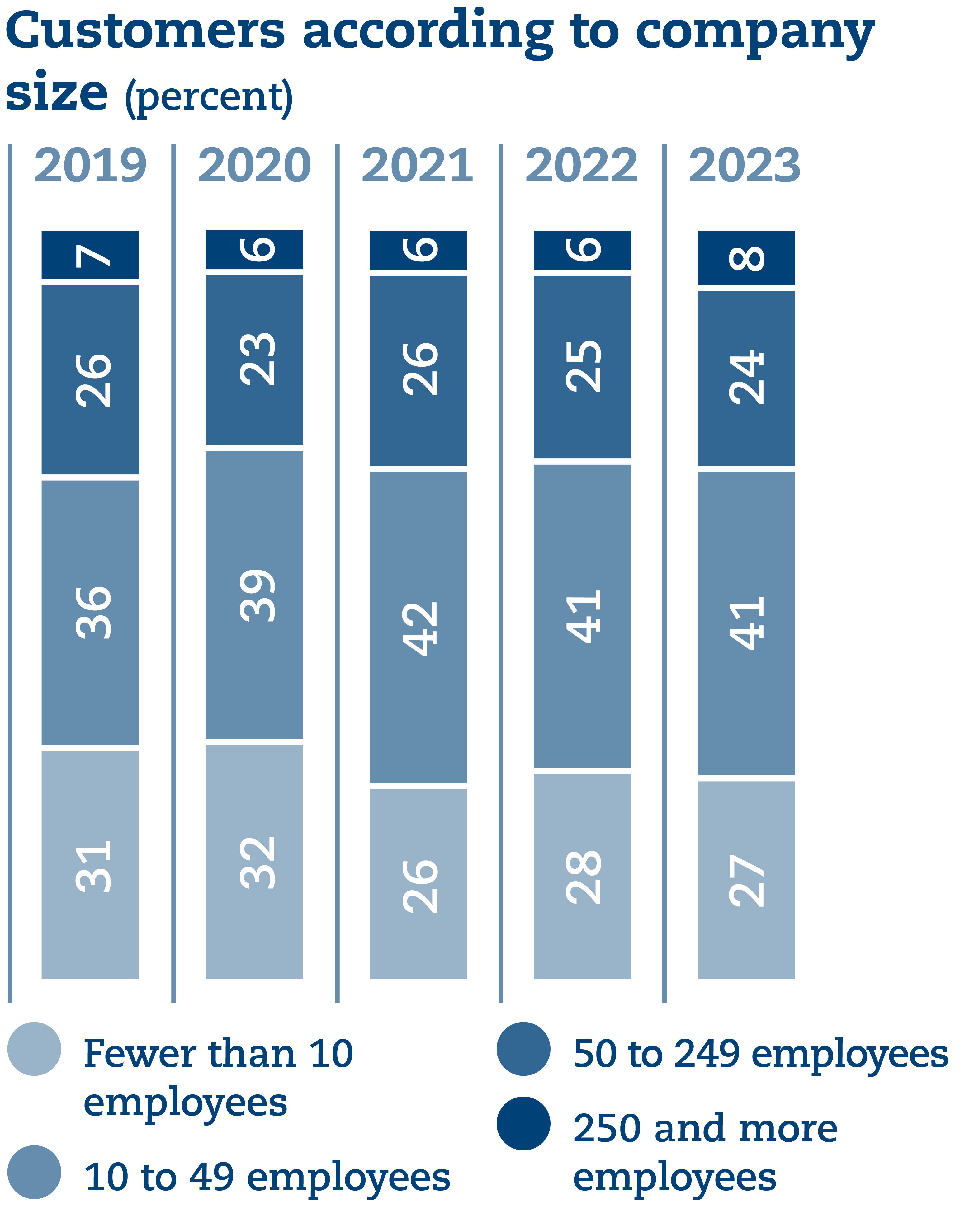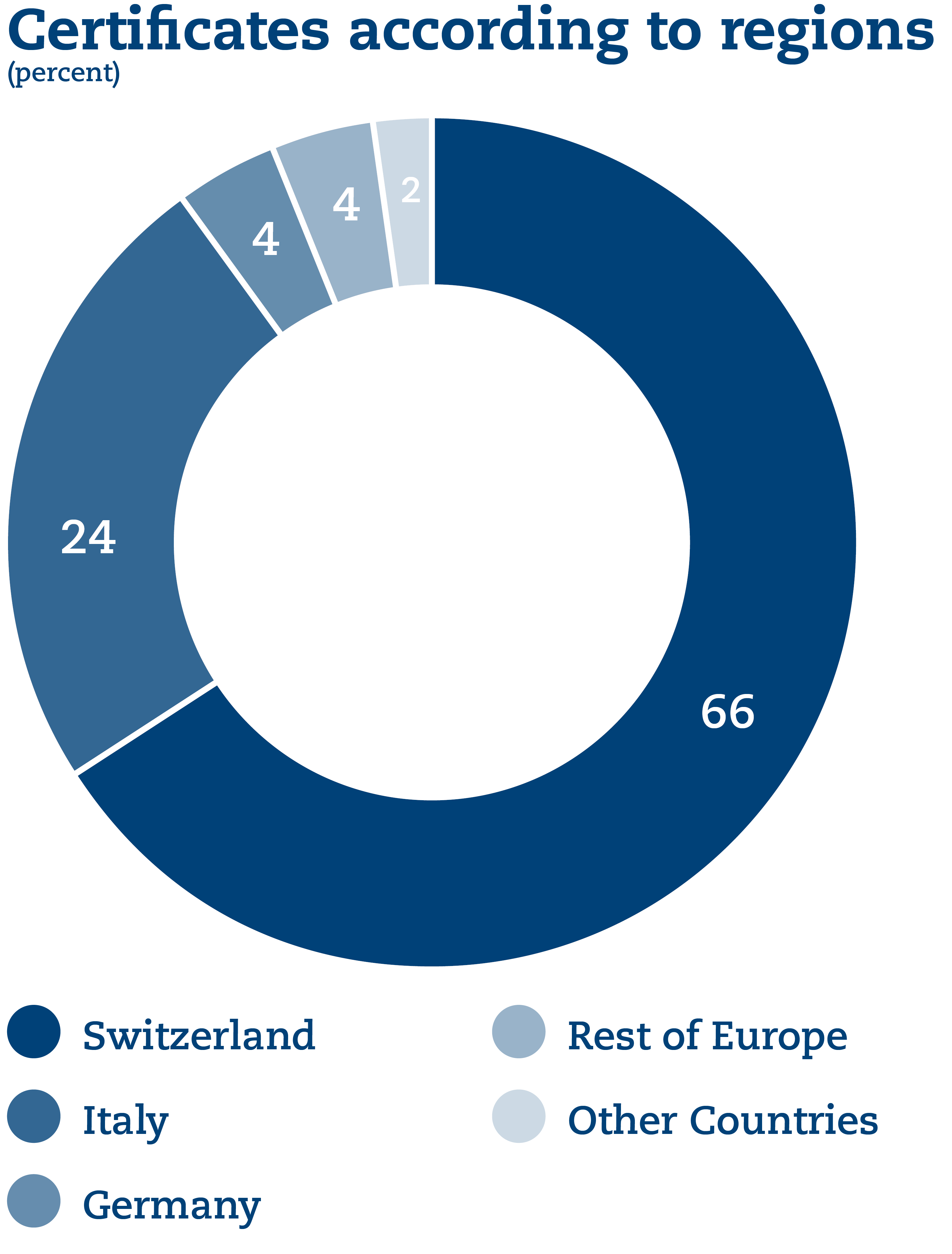1. Sustainable corporate governance // 2. Business model and business performance // 3. Social affairs // 4. Environnment
2. Business Model and Business Performance

CEO Felix Müller at a team meeting in the auditorium of the head office in Zollikofen near Bern.
2.1 Strategy and market
SQS pursues a so-called 3A strategy*:
-
Expansion of the position as the leading provider in Switzerland for the auditing and certification of management systems in the accredited or regulated sector (strategic business unit 1)
-
Establishment of a strong market position for the evaluation and verification of sustainable corporate governance (strategic business unit 2)
-
Recognised provider of further education in the area of management system standards and methods (strategic business unit 3)
*3A stands for “Ausbau” – expansion, “Aufbau» - establishment and «Anerkennung» - recognition
Offerings
The value propositions to our clients can be differentiated according to these three SBAs as follows:
|
Offerings |
SBA1 |
SBA2 |
SBA3 |
|
Credibility |
X |
X |
|
|
Trust/recognition in the market and towards interested parties |
X |
X |
|
|
Premium service |
X |
X |
X |
|
Certificate/Label |
X |
|
|
|
Confirmation on a normative basis of performance and conformity promises => Attestation («Assurance Statement»)/Audit Opinion |
|
X |
|
|
Contribution to sustainable corporate success |
X |
X |
|
|
Internationally accredited services |
X |
|
|
|
Guarantee of process capability (internal security) |
X |
|
|
|
Reduction of complexity |
X |
|
|
|
Platform approach (comprehensive solution portfolio) |
X |
X |
|
|
Qualification/further education by means of (in-house) seminars, certificate courses, conferences, etc. |
|
|
X |
|
Practical, efficient, inspiring qualification/further education |
|
|
X |
|
Lecturers with auditor qualifications and extensive practical experience (best practices at first hand) |
|
|
X |
|
Support in interpreting standards |
|
|
X |
Value propositions
The value propositions to our customers can be differentiated according to these three SBAs as follows:
|
Value propositions |
SBA1 |
SBA2 |
SBA3 |
|
«Our external perspective brings clarity of thought and order to your organisation.» |
X |
X |
|
|
«Your company will continue to develop with our management solutions.» |
X |
X |
X |
|
«In our further education program, you will develop the skills to solve tasks and advance professionally.» |
|
|
X |
|
«The SQS network enables you to exchange experiences with colleagues.» |
|
|
X |
|
«Our verifications and certifications provide you with credibility and market access.» |
X |
X |
|
|
«Our valuations provide you with transparency, comparability and credibility.» |
|
X |
|
Industry sectors
The industry sectors in which we realise these value propositions are manifold:
-
Automotive
-
Railway and public transport
-
Construction
-
Education
-
Services
-
Financial services
-
Health and social services
-
Industry in general
-
Information and communication technology (ICT)
-
Food and packaging
-
Aviation
-
Medical technology
-
Paper, wood and forestry
-
Tourism
The diversity of our clientele contrasts with the relative uniformity of company size (see chart «Clients by company size»): 68% per cent are micro and small companies (up to 49 employees) and 24% are medium-sized companies (50 to 249 employees). Only 8% are large companies. In addition, our clientele is relatively homogeneous in terms of origin (see chart «Certificates by region»): The two main markets of Switzerland and Italy account for 90% of all certificates issued.
SQS operates in a «People's business»: Customer relationships in the certification and assessment business are highly personalised. Auditors therefore play a key role in our value proposition and in the fulfilment of our value proposition.
Accordingly, SQS invests considerable resources in training and further education (see Chapter 3 «Social Affairs»). This is not only about imparting competences, but also about the SQS core values: credibility, neutrality, independence, honesty and incorruptibility. It is only by combining these competences and virtues that we create the added value that makes us successful in the market. An expression of the appreciation and trust of our customers is their loyalty: at the end of 2023, customer loyalty averaged 13.4 years; 59% of customers had been with SQS for more than 9 years.
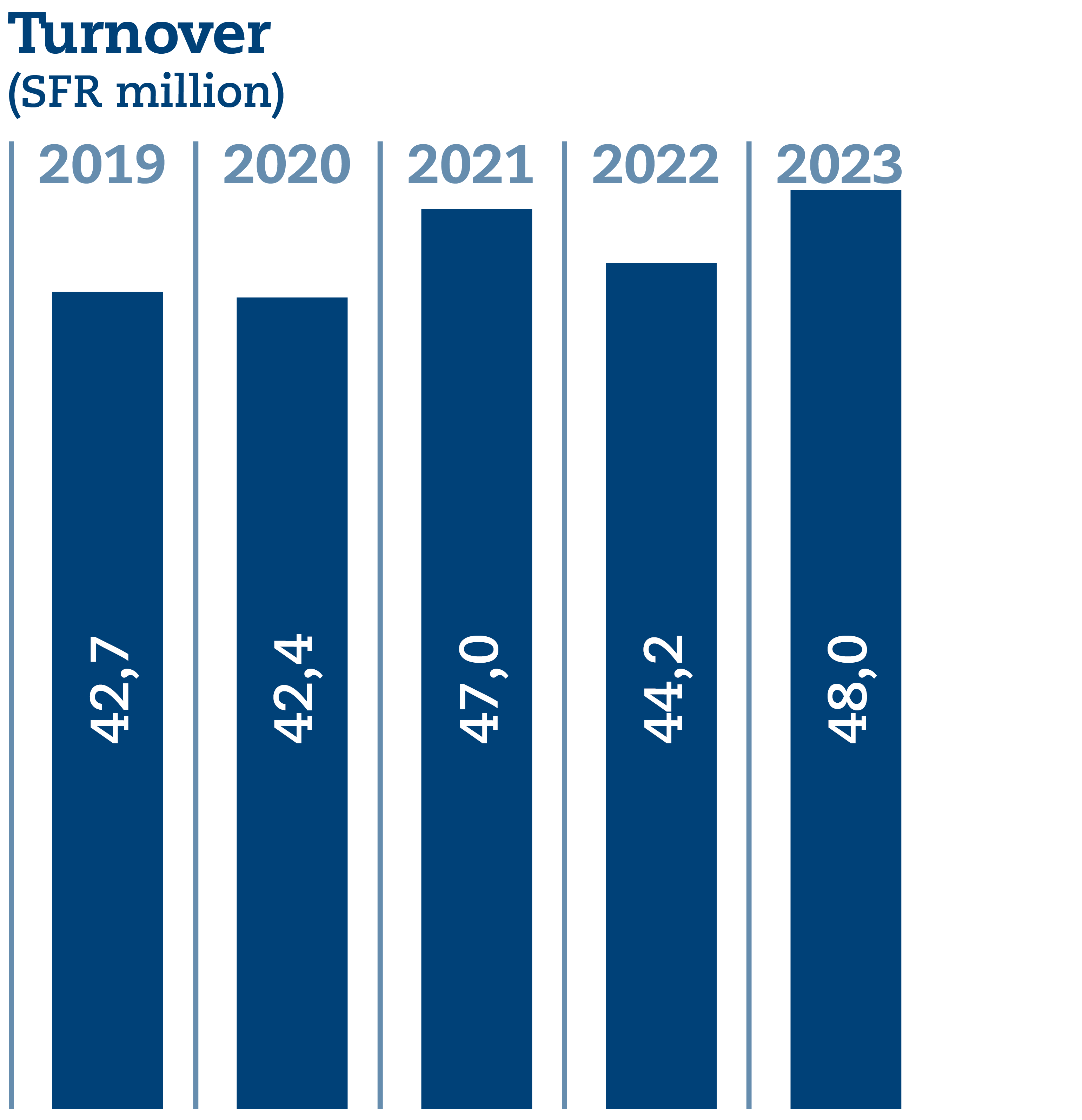
2.2 Business performance
In 2023, SQS achieved the highest turnover in its history at CHF 48.0 million, an increase of almost 9% compared to the previous year (CHF 44.2 million). Earnings before interest, taxes, depreciation and amortisation (EBITDA) even rose by 15% to CHF 1.8 million, while the EBITDA margin increased from 2.6% to 3.7%. This result is all the more remarkable given the considerable and increasing cost pressure exerted by the regulatory environment: The requirements of government accreditation and private approval bodies are leading to an ever-increasing administrative burden. In addition, in the name of impartiality and high qualification requirements, these bodies are increasingly restricting the opportunities to deploy auditors in a wide range of scopes. This reduces economies of scale, exacerbates the shortage of skilled staff and thus drives up costs.
Strategic Business Areas 1 and 2
In 2023, SQS had over 100 products in its portfolio. A distinction was made between products
- in the accredited area (authorisation to certify recognised standards by state accreditation bodies);
- in the wider regulated area (authorisation for certification of private standards by private approval bodies);
- in the non-regulated area.
Further information on accreditation in general and on SQS accreditations and authorisations can be found in the blog post «Accreditation: separating the wheat from the chaff» (in German). The Swiss Accreditation Service is by far the most important accreditation body for SQS, ahead of the Italian Accredia.
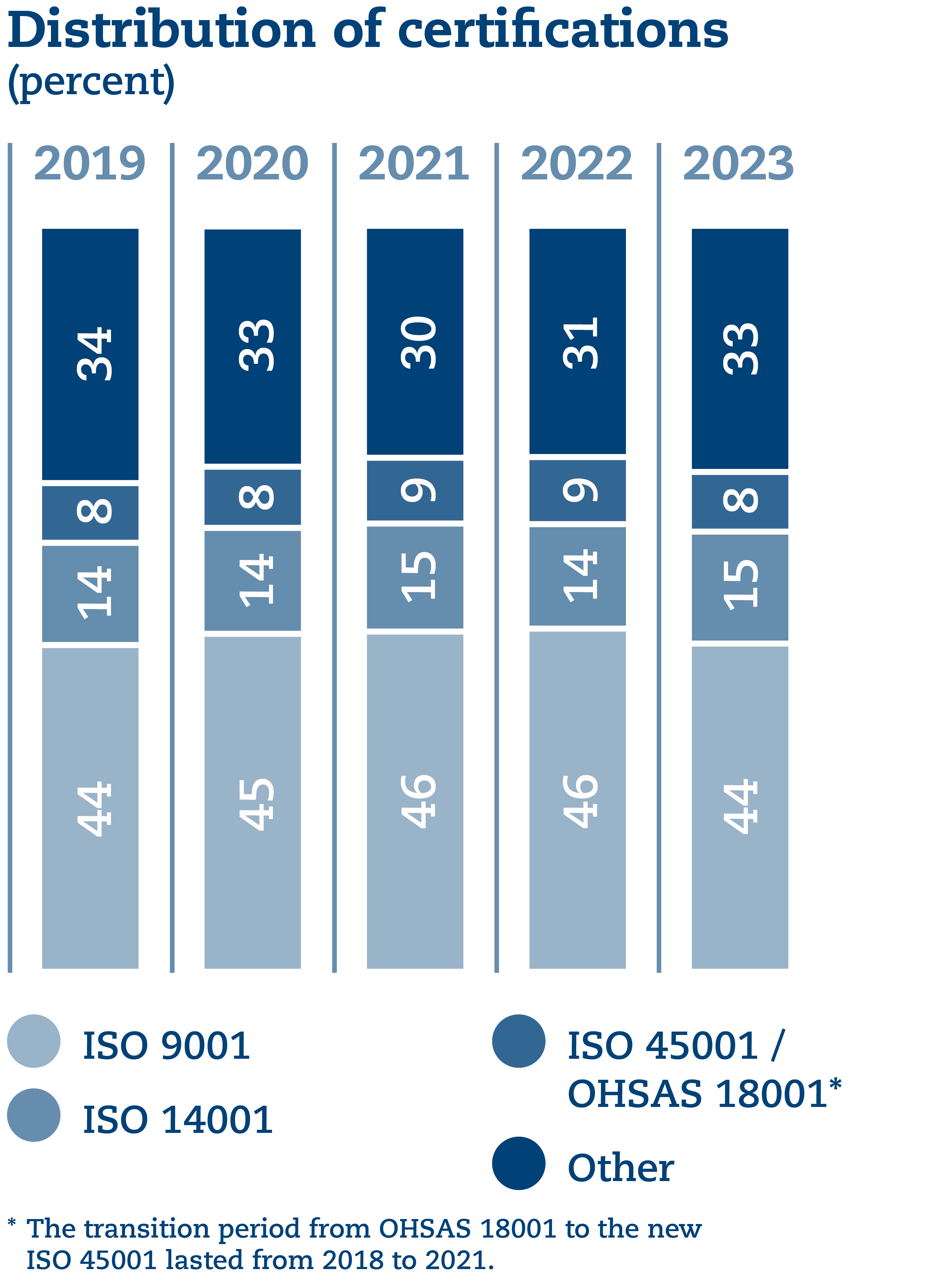
The large number of products should not obscure the fact that the majority of sales are generated with three main standards in the accredited area (see chart «Composition of certifications»): ISO 9001 (quality management), ISO 14001 (environmental management) and ISO 45001 (occupational health and safety). In the last five years, their share of all certifications has always been between 64% and 70% (2023: 67%). The segmentation of new registrations suggests that this is likely to remain the case in the near future: the three core standards mentioned above account for 455 of the total of 706 newly concluded contracts.
The core standards - in particular ISO 9001 - are all the more important as they often form the basis for the integration of other standards for customers and are therefore a driver of cross-selling, in which SQS can utilise the competitive advantage of its broad range. In our marketing and communication activities, we therefore consistently emphasised the benefits of integrated management systems (see, for example, the blog posts (only available in German) Mit Systemintegration zur Komplexitätsreduktion, Fertig gebaut ist nie: Wie und wozu Implenia und Lazzarini ihre Managementsysteme integrieren, or Erfolge von heute, Themen von morgen: Erkenntnisse zu Integrierten Managementsystemen in der DACH-Region). At the end of 2023, 17% of customers had three or more SQS certificates.
In absolute terms, demand developed positively in both main markets, but was particularly dynamic in Italy: the proportion of certificates issued in Switzerland fell to 66% in 2023 (previous year: 67%), while the proportion of certificates issued in Italy increased to 24% (previous year: 23%).
In Strategic Business Area 2 - the assessment and verification of sustainable corporate governance - business with esg2go developed positively. This tool - developed by the Centre for Corporate Responsibility and Sustainability (CCRS) at the Fribourg School of Economics - allows SMEs to credibly assess and communicate their sustainability performance (proof of sustainability) with relatively little effort. In 2023, SQS concluded a contract with CCRS and Adjumed Services AG, which operates the esg2go digital platform, to strengthen its role as a strategic partner. In this role, it carried out a pilot project with the association and SQS member HotellerieSuisse, in which 17 businesses used esg2go. Based on the positive experience, a second, larger pilot project was planned for 2024 with the aim of developing esg2go into the standard for sustainability assessment and reporting for the hotel industry - a typical SME sector. esg2go was also well received outside of the hotel industry (31 of the 36 verified businesses/locations were in other sectors).
The subsidiary SQS Deutschland GmbH carried out its first major customer orders in its second financial year. The Stadler Rail Group was supported in the preparation and verification of a sustainability report.
Strategic Business Area 3
Further education in the area of management system standards and methods developed very favourably. The turnover grew by 30% to CHF 1.34 million in 2023 (previous year: CHF 1.03 million). As the number of events only increased by 12% (to 134 from 120 in the previous year), the profitability of SBA3 also increased. The proportion of online events fell again - to a total of 54 (2023) from 69 (2022) - but this format has established itself as an integral part of the offering. Participant satisfaction increased slightly from a high level to 4.56 (previous year: 4.53). The highest score is 5.0.
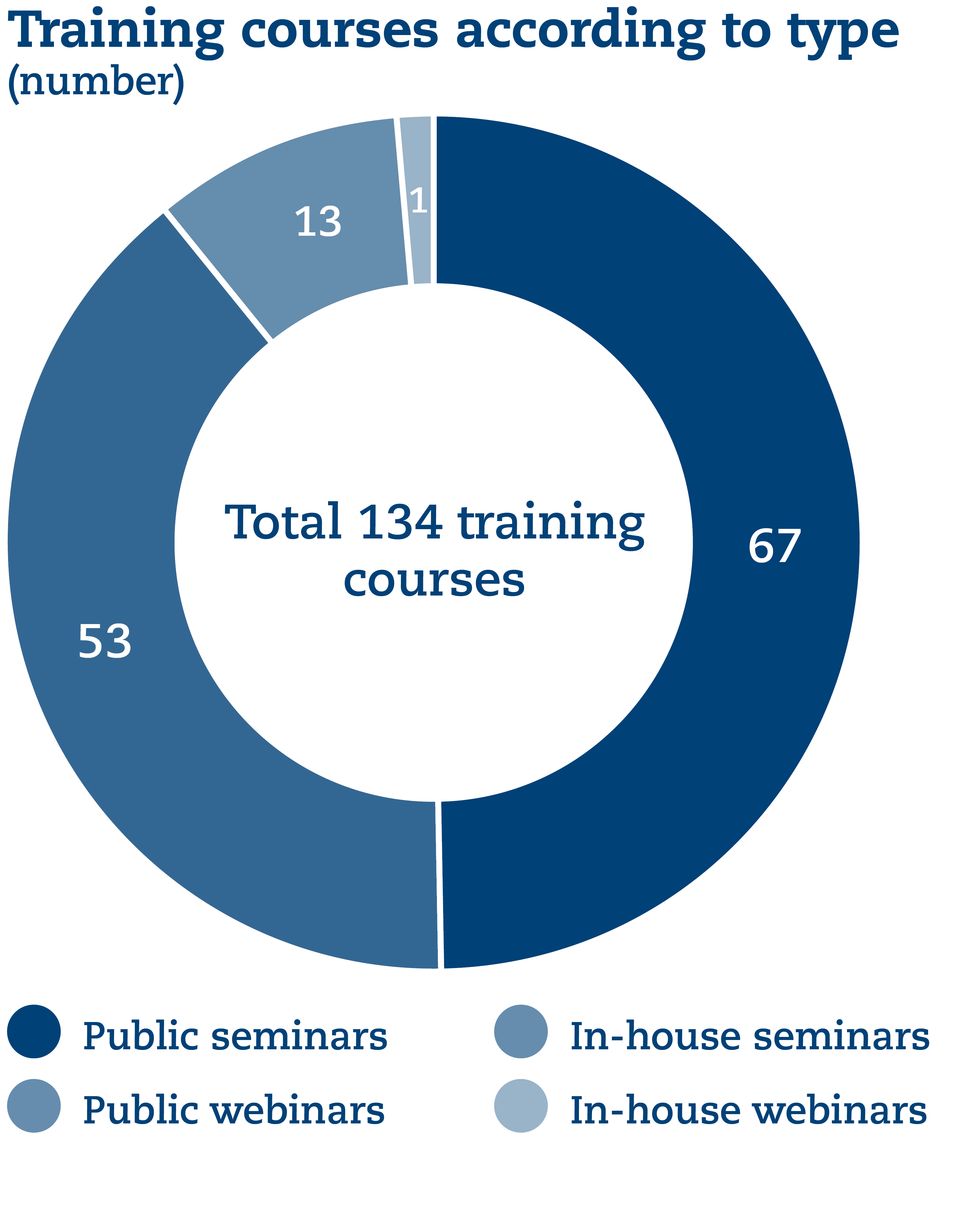
Training programs in Switzerland
These key figures prove that the SQS approach to further education is proving its worth. It can be summarised as follows:
- No sustainability without holism. Our training programs are based on the same holistic approach that we use in assessment and certification.
- Education is not a canned product. We understand education as a two-way teaching-learning process in which the interaction between the participants and with the lecturers is crucial.
- Knowledge must achieve effects. We design our educational programs to be target- and practice-orientated.
- It's the mix that makes the difference. Our experienced lecturers bring together conceptual thinking and practice-proven action.
- No degree without a connection. Our further education programs are coordinated in such a way that professionals can continue their training with us for years, from beginner to specialist, from novice to expert.
Meanwhile, SQS Germany built up a portfolio of seminars and webinars on various topics relating to sustainable corporate governance (verification of sustainability reports, due diligence in supply chains, preparation of greenhouse gas balances, etc.).

